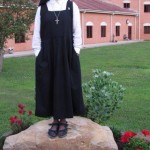Over at Deacon Greg’s place he notes a study and asks Is being a Good Samaritan a Matter of Genetics?
Or grace, or a combination of the two? Perhaps specifically-graced-genetics?
This seems a timely question in light of the passing of the fascinating Mother Antonia Brenner (born Mary Clark), foundress of Eudist Servants Of The Eleventh Hour and one of those formidable “Irish Catholic” women so many of us have known and loved. She is survived by her seven children.
The diminutive, twice-divorced mother of seven spent more than three decades at Tijuana’s notorious La Mesa Penitentiary, making her home in a 10-foot-by-10-foot cell. She offered inmates everything from blankets to medicine to bail money. She led prayers and washed the dead for burial. La Madre Antonia, they called her, and she said they were mis hijos, her children. . . She was 86.
With her small frame, sunny disposition, and heavily accented Spanish, she delved fearlessly into a world riddled with poverty and violence, once quelling a riot by walking into the darkened penitentiary taken over by armed and angry inmates.
She urged guards to respect the petty thieves, rapists, murderers and drug traffickers in their custody, speaking out against beatings and torture of inmates. But she also reached out to those in law enforcement, raising funds for the families of those killed in the line of duty.
“I think prison freed me,” she once said in an interview.
So, her second marriage ended**, her children grown, she went where the Holy Spirit led her — moved herself right into an unheated, cold-water Tijuana prison — and perhaps became her most authentic self.
This is dynamic Christianity; the willingness to “take on the smell of the sheep” as Pope Francis has urged his bishops. This is how real, lived evangelization explains for many what Pope Francis meant when he eschewed the “solemn nonsense” of proselytizing.
May she rest in peace, and may her order, comprised of mature women with “late” vocations increase.
I like this video of Mother Antonia, advising us — as Pope Francis has, quite a lot, these past seven months — on the evils of gossip, “how delighted evil is when we talk against each other!” I love especially that she brings up the Saint Philip Neri story:
And more here: “Who am I to forgive; God is the one to forgive. God to God. But know what you’ve done.” Again, she more or less explains Pope Francis’, “who am I to judge?”
**I know some will ask how a twice-divorced woman can be a religious. Yes, of course this is possible. I can find no information as to possible annulments, but she married her second husband (in Las Vegas) as soon as the first divorce came through, so let’s assume she did not get an annulment. Without it, her second marriage would never have been valid within the church, and post-divorce could literally have been dealt with in the confessional. Without an annulment, she would still be considered sacramentally wed to her first husband, until he died, which for all I know, he did by middle age.
Next year, Pope Francis will be looking at issues of marriage and family, and many are wondering if the church will open up the Eucharist to divorced Catholics who remarry without an annulment. It will be interesting to see how that goes.
I’ve always been of two minds about it. On one hand, I think annulments get a bad rap, because there is a potential for real healing, real instruction and self-understanding available through it. And I certainly don’t think we can address divorce lightly, or shrug it off; Christ himself emphasized against it, and when we become a church that stops giving precedence to his teachings, we’re screwed.
But on the other hand, things are not always black and white. There has to be some way to broaden mercy — to acknowledge and serve the wideness of God’s mercy — in dealing with our divorced members. Perhaps Mother Antonia will be a patron of that discussion!











